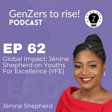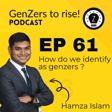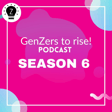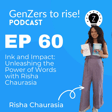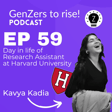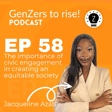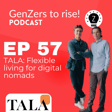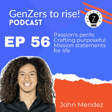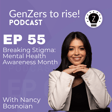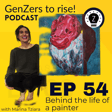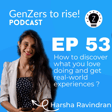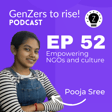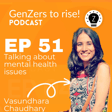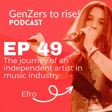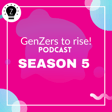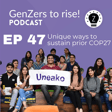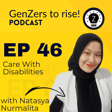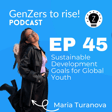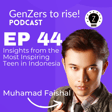Become a Creator today!Start creating today - Share your story with the world!
Start for free
00:00:00
00:00:01

Multicultural advocacy platforms explained
In this episode we are chatting with the founder of The Colour of Us organisation Sonya Colattur, about the multicultural advocacy platforms. In our conversation we are covering subjects like:
- Do we feel comfortable with today’s society ?
- Advice for parents that are racing multiracial kids
- How do we deal with the fact that seniors can’t afford their companion pets? Why is this a global issue and how does it impact the communities ?
Also Sonya shares with us advices for kids who might be struggling to find a community and be comfortable in their identity. This episode is all about racial advocacy and solving existing community problems.
You can connect with Sonya and The Color of Us org at https://lnkfi.re/thecolorofus
Follow ChangemakerZ https://go.changemakerz.org/follow
Episode's page https://podcast.changemakerz.org/thecolorofus
Access exclusive content on the ChangemakerZ app at https://app.changemakerz.org
Produced by Vasilis Skarleas
Transcript
Introduction to Changemaker-Z Podcast
00:00:01
Speaker
Hello everyone, I'm Kennedy. And I'm Vasiles. We run Changemaker-Z, a student-run initiative that aims to empower, educate, and connect Gen Zers interested in entrepreneurship. We interview teenagers with impactful projects and create resources to help you change the world. If they can't do it, so can you.
00:00:23
Speaker
On this podcast, we discuss the logistics of creating different types of projects with Jin Ziers who have already done it. We will leave our social media and website information in the description.
Sonya Kolotur and The Color of Us Mission
00:00:42
Speaker
Have you ever entered another episode of the Dancer's Rise podcast? With us in the studio is the founder of The Color of Us, Sonya Kolotur. The Color of Us is a multi-racial and multicultural advocacy platform and a grand post-pantry, a non-profit that brings awareness to the limited financial resources of senior citizens by providing them with monthly pet food supplies. In addition to that, Sonya is a former TEDx Guild speaker and she has been featured on ABC 15 and CBC National News.
00:01:11
Speaker
Today's episode is all about racial advocacy and the color of us non-profit. Sonya, welcome to the show, so nice to meet you. It's nice to meet you too, thank you so much for having me.
00:01:21
Speaker
Yes, we are so excited to have you.
Sonya's Archery Journey and National Ranking
00:01:25
Speaker
We, it wasn't mentioned in the bio, but like another thing that I saw when I was like researching you is this girl is like a youth Olympic archer. Like, I don't know. It's just, it's kind of, I wanted to ask about that. Cause it's not, it's not a typical sport. I feel like when you're asked, is it, is it considered a sport, right? Yes, it is considered a sport.
00:01:48
Speaker
So, yeah, I'm just interested in how you got into it. I'm like, okay, Katniss Everdeen? That is the goal. I actually got into it at an after-school program that my family put me in. In Arizona, archery is a really big sport, so my school in, I believe, eighth grade had
00:02:09
Speaker
an informational session and I had to stay late that day anyway so I decided I would go to it and after that I just found a love for the sport. So my parents decided that because I loved it so much they would enroll me in a club outside of school and I've been involved in it ever since. Since then I've become pretty competitive and I'm currently a nationally ranked archer in Baraboke that archery and I hope to pursue that in college in the future.
00:02:35
Speaker
OK, amazing. And that's OK. That's interesting. It's really big. I'm the viewers on. I'm from Minnesota. We are all on. We're all into hockey and whatnot. So really, I don't think there probably is some archery around, but it's not really big here.
Embracing Biracial Identity in Arizona
00:02:49
Speaker
So speaking of Arizona, can you give us like just a little bit of background on your upbringing in Arizona? Like were you in the suburbs? Like were you like one of the only POC in your class, like neighborhood type of thing? Or how was that?
00:03:04
Speaker
And guys, for anyone who don't know, if you want to explain about your identity to like, I know you're half Indian. Definitely. So I grew up in the suburbs of Arizona. And during that time, there was very few people growing up who were identified as POC, particularly being biracial. My father is from India and my mom is Irish American. So growing up, I never saw people that looked like me or had my same
00:03:32
Speaker
heritage or cultural background. In school, I was one of the few people of color or first generation children. And growing up, it didn't necessarily bother me too much, but it enabled me to conform to one side of my identity. So for my entire childhood, I identified as monoracial Indian.
00:03:53
Speaker
And when people would ask, I would say, oh, I'm Indian. And then they would come to my house and they would meet my mom and they would tell me, no, you're not Indian. And that always really confused me growing up. And it's just now that recently within my last few years of high school that I've really grown into my multiracial and biracial identity and acknowledge both parts of my heritage.
Multiracial Awareness and The Color of Us
00:04:14
Speaker
That's a big part of my work with the color of us, because I think a lot of people who grow up in my similar situation
00:04:21
Speaker
where they may be the only POC in their class or they may be the only biracial person in their friend group that they know, isn't fully comfortable embracing both elements of their heritage. And I really wanted to bring awareness to that. Well, thank you for sharing that. But when you said you kind of identified more like just basically Indian on your father's side, did that cause any type of rift like with your mother at all? Because... That's a great question.
00:04:51
Speaker
My mom was always really supportive of how I identified and connecting with my Indian culture. I think growing up in America, being away from cultural roots of India, she really tried to emphasize cultural traditions, holidays.
00:05:08
Speaker
connecting with that side of my family. So when I identified as Indian, I don't think she saw that as me embracing only my moral racial identity and acknowledging my multiracial one. I think she saw that as, oh, she's finding pride in her cultural upbringing.
00:05:27
Speaker
And it was only until later that I realized that it wasn't just that I was finding pride in my Indian heritage, it's that I was only identifying myself that way and missing out on all of the Irish American ancestry that my mother brought. So she's always been incredibly supportive and even now with my journey with the color of us and identifying more as multiracial, she's always been really supportive of that for me.
Challenges in Establishing Multiracial Heritage Week
00:05:52
Speaker
Do you feel comfortable in your culture today? You said that you were the only person in your class with this unique identity. But in general, how do you feel about the rest of the country, maybe the world, is still something that you have to work through sometimes, personally?
00:06:15
Speaker
That's a really good question. It actually reminds me of one of the first podcasts that I did, and it was with Dr. Rudy Gabora Jr. of ASU. It was titled This and That, and we talked about how identifying as multiracial or biracial mixed race, multicultural, et cetera, you can identify with those elements of your heritage, but that doesn't mean you're any more of this and any less of that. You can connect with both elements equally.
00:06:45
Speaker
And I think now that's something I'm still trying to struggle with, embracing since for a while I didn't know anything about my mother's heritage, my Irish ancestor. I just learned that I'm a quarter Swedish a few, I think about a year ago.
00:07:01
Speaker
And I'm really trying to embrace and connect with that element of my culture as well. Personally, it's still a struggle trying to navigate all those different facets to my identity. But in the context of larger society, I'm really content with how I identify and the changes that I'm bringing to helping other people broaden their horizon of what it means to be multiracial. Thank you for sharing that.
00:07:29
Speaker
Right now, let's move on to the Color of Us subject. What are the different ways people can become involved into your non-profit, the Color of Us?
Engagement Opportunities for Multiracial Youth
00:07:42
Speaker
The Color of Us is really focused on increasing conversation around multiracialism and multiculturalism. I do this through blogs, podcasts, art, and social media promotions.
00:07:58
Speaker
For the color of us, contributors would be multiracial and multicultural youth who are interested, and particularly youth being Gen Z or under 18, because it's really a platform to help youth connect with the elements of their heritage. Within the mixed race community, there's a lot of really great organizations for adults or parenting. There's really few resources for multiracial youth, and that's something that I want the color of us to focus on.
00:08:27
Speaker
So youth who are interested, who do identify as multiracial or multicultural, can apply to join the platform and contribute in the forms of blogs, op-eds, podcasts, or art submissions.
00:08:39
Speaker
So another thing that you do through The Color of Us is a lot of like advocacy type of work.
Advocating for Multiracial Recognition
00:08:44
Speaker
And, you know, a huge one is you work to get June 7th through June 14th recognized as Multiracial Heritage Week in Arizona, which makes Arizona only the 20th state to recognize it in the US. So I can only imagine how challenging that was. How long did this take you to do? Do you have any stories about that process?
00:09:06
Speaker
Actually, I think the biggest story that comes from that process is how confusing and unaccessible government legislation can be in some scenarios. The process itself wasn't too hard as the Arizona Governor's Office has a process for proclamations that you can go through and you can go to the website and submit it. However,
00:09:32
Speaker
That form is really hard to find and locate. And when I first began this journey of thinking that there should be some type of acknowledgement of the multiracial population in Arizona, I had no idea that that was even an option. It was only through a connection with the governor's office and working in regards to like in conjunction with members of the office that I was able to learn that this process does actually exist.
00:10:02
Speaker
When I went to submit the proclamation, however, for proclamations, you need to submit it up to six weeks in advance. And by the time I had found the form and that there was actually a process for this, I think I was at five and a half weeks exactly. So I was really stressed that, oh no, this isn't going to happen because I missed the deadline since I didn't know that this exists.
00:10:23
Speaker
So I really work to try to form connections within the governor's office, reach out to people in the proclamation sector and try to get this to be pushed through. I was able to form a connection with someone in the governor's office of youth faith and family who actually went down to the proclamation office and asked the people what the status was on the proclamation and helped to go through faster.
00:10:46
Speaker
So I'm really grateful for all the support that I got from family and friends and members of the Governor's Office of Youth, Faith and Family in helping me with that process. This is really wonderful. Someone that's not from United States, I would like to know, like, what do you think that's going on with
Need for Multiracial Recognition in the U.S.
00:11:05
Speaker
the other states? Like, I don't know what's, you know, the percentage of the multiculturalism in other states of the United States, but like,
00:11:14
Speaker
The fact that it's so difficult from the government side and the local governments to proceed with all these procedures that needs to be done, what do you think personally? Do you think that in other states it's as difficult or not difficult to move on with that process? What do you think that it could be a solution to that problem if exist?
00:11:40
Speaker
Thank you so much. That's a really great question. Speaking from my experience personally as someone being multiracial in Arizona, I think the process itself was more challenging, not only because there's such a limited number of people that identify as multiracial in this state, but also because of the historical outlook to anything in terms of race relations in Arizona. Traditionally, our state hasn't been known as the most progressive in those issues.
00:12:08
Speaker
any type of conversation around culture or race relations often met with resistance from one or more political factions. In states with a larger number of multiracial individuals, there's been great strides taken forward. I know in California, there's been forms passed to include multiracial options within school systems and other stuff in that field. But overall, as a country, the multiracial population has been growing dramatically.
00:12:39
Speaker
In 2020, the census showed that the population increased by almost over 200%. So as a country, we really need to be taking into account this demographic more, and that includes first acknowledgement. A lot of, like, as a personal example, when I go to submit forms for school, doctor's offices, et cetera,
00:13:06
Speaker
and I have to come to the category of race and ethnicity, there's either a check only one box or they won't have mixed race or multiracial, so I click other. And not only is that a problem because it feels like I can't identify with anything and I don't fully belong in this new American society, it's also a problem because when you think of in terms of doctor's offices, certain races are more prone to specific types
00:13:33
Speaker
of conditions or diseases. And when I select the box other, that doesn't give a very good indication. So as a society, we really need to be thinking about this demographic and the issues that encompass it. And the first step is really to acknowledge the increase in the multiracial population and that we're a really prevalent part of American society.
00:13:54
Speaker
Yeah, that makes so much sense. And I don't really think about, I never really thought about it that way. Like I know, I'm not sure what other states have identified that week, but it's like, you think like we have like Hispanic heritage month, like different cultural weeks and months or whatever, but it's like the mixed population, I feel like is not, it was never really acknowledged. It's not something that I thought was a problem. So,
00:14:23
Speaker
I wanted to move on to another subject.
Art Inspired by Mixed Heritage
00:14:26
Speaker
Your website features some beautiful artwork created by you. I would love to know the inspiration behind your, you know, ancestral tears piece, for instance. Yeah, I, the ancestral tears. So obviously you can't, you guys can't see it, but it's just like this image of a man or being just like laying down. It's really beautiful.
00:14:52
Speaker
Yeah, so actually, there's a really unique story with that piece. When I first founded The Color of Us, I had a really hard time connecting with other members in the mixed race community just because it's a really small network and it's really difficult to find people. So the first association that I came across that even acknowledged the mixed race experience was the Critical Mixed Race Studies Association. And through that organization, there's an annual conference held every year.
00:15:22
Speaker
with global experts that come in and talk about different issues affecting the mixed race community or different pieces of policy that are being put into play, research in the field, etc. And one of the things that they do, they do submissions for research papers for undergraduates and art submissions from anyone across the world. I had never seen an art competition that offered submissions specifically for mixed race identity.
00:15:49
Speaker
In my free time, I like to paint a lot and a lot of it involves cultural background and heritage, but I never really found a place to submit that to that would understand the story that I was trying to tell. So when I saw this opportunity, I thought it would be a really great way to put my artwork out there. And even if I didn't win, it would be great to know that it was going to a cause where people would look at this and understand what it was about. For that year, the theme of the artwork was ancestral futurism.
00:16:18
Speaker
And what I interpreted ancestral futurism to mean was how do we connect with our ancestry but move forward into the future acknowledging that as a core part of our heritage.
00:16:28
Speaker
And the two pieces that I submitted, the first one, I included different splotches of color that were each supposed to represent different facets of identity and multiculturalism. So in thinking of my own life, I know that for me, I celebrate Diwali with my Indian side of my family and my mom will make it.
00:16:49
Speaker
soda bread occasionally, and sometimes those two holidays overlap. What I really wanted to show with that piece is there's so many different elements to culture and identity in being mixed race, but that all converges to form this beautiful human person with such unique experiences. With the other piece entitled, Ancestral Tears, I wanted to talk about specifically how in American society, at least with my experience,
00:17:19
Speaker
I was often told to choose one element of my identity. And in that way, I ignored my Irish ancestry and my Swedish ancestry because, phenotypically, I don't look that Irish or Swedish. I look more Indian. And I think that's a problem that a lot of mixed race people can relate to in terms of having to conform to one element of their identity because other people don't see it. And I really wanted to show with that piece how when we do that,
00:17:49
Speaker
We're not only hurting ourselves because we're depriving ourselves from this unique facet of our experiences. We're also ignoring the ancestral traditions that have come down from that time. And I think in my piece where the figure is kneeling, I wanted to show that the internal pain and suffering that can often bring when we ignore parts that make us whole merely to conform to society's standards.
00:18:17
Speaker
Well, it's really beautiful and impactful. And it struck me in a way.
Young Artist Involvement in The Color of Us
00:18:22
Speaker
So, and correct me if I'm wrong, but a part of Color of Us, you can apply to submit artwork and be a part of it, correct? So if you're an artist, it doesn't matter what type of medium. No, you can do any type of media. I know one of our fellows in the Color of Us, she's working on a mixed media art piece.
00:18:42
Speaker
And I know there's been a few ideas to do poetry and film in the past, so any type of media is welcome to be submitted. Yeah, so fellows, if you're interested at all in becoming a fellow, check it out. Ages 12 to 18 is what's available.
Grandpa's Pantry: Community Service Initiative
00:19:00
Speaker
But I also kind of wanted to talk about your other nonprofit. Well, your nonprofit, the Grandpa's Pantry, which is so cute. The name is so cute.
00:19:11
Speaker
I was wondering, it's kind of a niche problem, like senior citizens needing help with getting food for their pets. How did you come across that? Yeah, so actually with that,
00:19:30
Speaker
I started it when I was 10 years old. So I grew up visiting my great grandmother who lived in an assisted living facility that allowed them to have companion pets. And while she didn't have a companion pet, I noticed that a lot of her friends had either dogs or cats, but she would tell us often about how Cindy next door couldn't afford the cat food or she was struggling to make the trip out because of disability.
00:19:56
Speaker
or disease or financial limitations lack of family support and wasn't able to fully care for a companion pet. I've always been in a family that really supports community service. So that year for my birthday, I decided I wanted to ask all of my friends to bring pet food and blankets and supplies instead of gifts or money or anything like that. So I could give that to the seniors who are struggling to take care of their pets. When I did that, I realized it's not just seniors in this specific facility. This is a universal problem.
00:20:26
Speaker
And I really wanted to do something to help. At the time I had a mom who was very, very involved in the parent student organization of my middle school. And I went to her and I said, I really want to do something and I want to make it legitimate. And I had done all this research about how to make a nonprofit. And she had been working on the board of the school to make the school a nonprofit. And I came to her and I said, I want to make this a 501c3 nonprofit. Where do I start?
00:20:55
Speaker
So she was really supportive, guided me in the right direction. And now six years later,
00:21:00
Speaker
It's grown to help almost 70 plus seniors in facilities across the Valley. The thing that I see that's really impactful with Grandpa's pantry, because like you said, it's a very niche issue, is that because it's a niche issue, there's no other resources. There's pet food shelters, there's like pet shelters, there's pet food pantries, but nothing specifically addresses the problem of senior citizens not having pet food.
00:21:30
Speaker
And that's such a big issue because senior citizens are in isolation in assisted living facilities, some don't have family and friends that come and visit, and often with these conditions they're very prone to loneliness, depression, and anxiety. But having a companion pet really helps that, yet they're unable to afford to have the pet.
00:21:52
Speaker
I think by having grandpa's pantry, especially now where I'm interested in going into law and public policy in my future, I'm really seeing how specific governmental policies can be used to help underserved communities like multiracial individuals or like senior citizens with companion pets and how that can fill a void where there isn't currently solutions to address these problems.
00:22:17
Speaker
I agree that companion pets are really important and recently I heard a news saying that in UK people that like bought, took or take care of their companion pet during COVID but now with the energy changes, prices, they have to keep them up so which is really really like this makes me feel bad, sad for the whole situation if we consider that this
00:22:44
Speaker
whole thing was reproduced due to the Ukraine's war and that it can impact so many people and again can impact not only you know physical our lives which happening with energy prices but also with people to know psychology that they need you know your their companion pets
00:23:07
Speaker
And now this is my favorite personal question.
Empowering Gen Z to Build Communities
00:23:10
Speaker
Do you have any advice for kids who might be struggling to find community and being comfortable in their identity? That's a really great question. I think for my generation, Gen Z youth, my biggest advice would be if you don't see the community that you can join or are struggling to find yourself fitting in someplace, make that community.
00:23:36
Speaker
I know so many people who will struggle with something, see inequality in the world or just notice a problem and will feel awful about it but not know what to do with it. Gen Z is an incredible generation in the youth in our community.
00:23:53
Speaker
are so incredibly powerful with so many opportunities to make a difference. So my first advice would be if you see something and you want to make a change that is possible and there are avenues to do that you should go for it. My second piece of advice specifically with struggling in terms of identity
00:24:11
Speaker
would be to really surround yourself with people who are supportive of your, not just identity, but style of life that you want. Far too often, we situate ourselves in communities where people tell us, no, you can't do this, you can only do that. Like in my case, people saying that I'm not really Irish, I'm Indian, and I can't identify with that side of myself.
00:24:39
Speaker
Whatever your situation may be in terms of your identity, make sure that you're placing yourself in a community of supportive people who really care for you and want to help you in that process. That is amazing advice. Thank you so much. And just to go off what you said, there are avenues and there are ways to do it, especially Gen
Connecting Gen Z through Online Communities
00:24:58
Speaker
Z. We have all the opportunity in the world with the Internet. As much as, don't even get me started, as much as the Internet's a blessing and a curse, it is
00:25:08
Speaker
more than ever we have the opportunity to make connections and meet with people. So going off of that the internet is
00:25:18
Speaker
Like you said, there's good and bad, but in terms of finding a community, there are people out there that exist beyond just your literal suburban world, in my case in Phoenix, Arizona. With the color of us, it's an online international platform and some of the best ideas and contributions have come from international members of the community. So if you are interested in finding other avenues to explore your identity,
00:25:44
Speaker
really think beyond just where you're located and into the world around you. Well, another fantastic episode has come to an end.
Closing and Social Media Info
00:25:53
Speaker
Sorry, that's it. Of course, we want to thank Sonja for joining us today and telling us about her organization and experience as a biracial woman. If you want to keep up with Sonja, all of her information will be in the description below. And until next time, don't forget to change the world. Bye.
00:26:23
Speaker
Thank you guys for listening. We hope you enjoyed the conversation. We had such a great time. Make sure to leave us a review. If you want more Changemaker's content, you can follow us on Instagram, at JinsearsToRise, and on Facebook, at ChangemakerZ.
